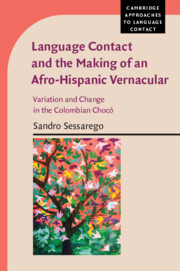 Language Contact and the Making of an Afro-Hispanic Vernacular
Language Contact and the Making of an Afro-Hispanic Vernacular Book contents
- Language Contact and the Making of an Afro-Hispanic Vernacular
- Cambridge Approaches to Language Contact
- Language Contact and the Making of an Afro-Hispanic Vernacular
- Copyright page
- Dedication
- Contents
- Figures
- Tables
- Maps
- Series Editor’s Foreword
- Acknowledgments
- 1 Introduction
- 2 The Place of Chocó Spanish in the Spanish Creole Debate
- 3 A Sketch of Chocó Spanish
- 4 Roots of Some Languages
- 5 Black Slavery in the Pacific Lowlands of Colombia
- 6 Testing the Legal Hypothesis of Creole Genesis on Colonial Chocó
- 7 Final Considerations
- Appendix
- References
- Index
6 - Testing the Legal Hypothesis of Creole Genesis on Colonial Chocó
Published online by Cambridge University Press: 23 August 2019
- Language Contact and the Making of an Afro-Hispanic Vernacular
- Cambridge Approaches to Language Contact
- Language Contact and the Making of an Afro-Hispanic Vernacular
- Copyright page
- Dedication
- Contents
- Figures
- Tables
- Maps
- Series Editor’s Foreword
- Acknowledgments
- 1 Introduction
- 2 The Place of Chocó Spanish in the Spanish Creole Debate
- 3 A Sketch of Chocó Spanish
- 4 Roots of Some Languages
- 5 Black Slavery in the Pacific Lowlands of Colombia
- 6 Testing the Legal Hypothesis of Creole Genesis on Colonial Chocó
- 7 Final Considerations
- Appendix
- References
- Index
Summary
Slavery existed since antiquity and assumed, depending on the times and places, different forms and legitimations (Winks 1972). As far as black slavery in the colonial transatlantic context is concerned, different scholars have suggested divergent hypotheses on the nature of the Spanish system in relation to the systems implemented by the other European powers that took part in the colonization of the Americas. In particular, while certain researchers, such as Tannenbaum (1947), have claimed that Spanish slavery was less harsh in the treatment of slaves than the other systems (see also Freyre 1940), other authors, such as Boxer (1962), Davis (1966), and Genovese (1967), have objected that even though the Spanish written regulations might have appeared more humane and less strict, the actual praxis of slavery across Spanish colonies would contradict such an idealized vision, so that the life of a slave living in a Spanish colony would have essentially been like the life of a slave working across the territories belonging to other European colonial powers, especially if such a captive was living in plantations or mines far away from the urban centers, where it was materially impossible to resort to the law to protect one’s legal rights.
- Type
- Chapter
- Information
- Language Contact and the Making of an Afro-Hispanic VernacularVariation and Change in the Colombian Chocó, pp. 149 - 189Publisher: Cambridge University PressPrint publication year: 2019


